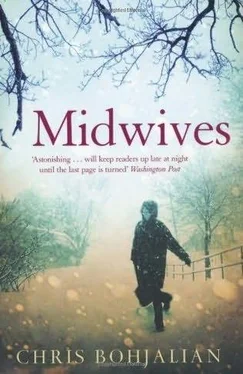Chris Bohjalian - Midwives
Здесь есть возможность читать онлайн «Chris Bohjalian - Midwives» весь текст электронной книги совершенно бесплатно (целиком полную версию без сокращений). В некоторых случаях можно слушать аудио, скачать через торрент в формате fb2 и присутствует краткое содержание. Жанр: Современная проза, на английском языке. Описание произведения, (предисловие) а так же отзывы посетителей доступны на портале библиотеки ЛибКат.
- Название:Midwives
- Автор:
- Жанр:
- Год:неизвестен
- ISBN:нет данных
- Рейтинг книги:5 / 5. Голосов: 1
-
Избранное:Добавить в избранное
- Отзывы:
-
Ваша оценка:
- 100
- 1
- 2
- 3
- 4
- 5
Midwives: краткое содержание, описание и аннотация
Предлагаем к чтению аннотацию, описание, краткое содержание или предисловие (зависит от того, что написал сам автор книги «Midwives»). Если вы не нашли необходимую информацию о книге — напишите в комментариях, мы постараемся отыскать её.
Midwives — читать онлайн бесплатно полную книгу (весь текст) целиком
Ниже представлен текст книги, разбитый по страницам. Система сохранения места последней прочитанной страницы, позволяет с удобством читать онлайн бесплатно книгу «Midwives», без необходимости каждый раз заново искать на чём Вы остановились. Поставьте закладку, и сможете в любой момент перейти на страницу, на которой закончили чтение.
Интервал:
Закладка:
It was just after six-thirty, and our porch light was on: Sometimes it would make the badges on their jackets sparkle.
"In that case, do you need to come in?" my father asked.
"We do, yes. But just for a few minutes."
He motioned them inside, and they wiped their shiny black shoes diligently on the mat near the stairs. I tried to remind myself that these two powerful-looking men were not evil, focusing in my mind on the gentle way the one with the mustache had spoken to my father. They both wore wedding bands, which meant they had wives, and if they had wives, they probably had children. And if they had children, then they were fathers themselves. Just like my dad. Remove the troopers' hats and the holsters, the guns and green jackets, and they were just regular old guys. There was no reason I should be frightened of them.
But, of course, I was.
"I'm Sergeant Leland Rhodes," the one with the mustache began, "and this is Corporal Richard Tilley."
"Rand Danforth," my father said, extending his hand first to Rhodes and then to Tilley. When he turned, he saw my mother and me standing in the hallway behind him.
"Connie, why don't you go upstairs. This shouldn't take long," he said, his voice even.
"I could finish cooking dinner," I offered.
"You could, but you don't have to," he said, and I felt my mother's hand on my shoulder, pushing me gently (but without ambiguity) in the general direction of the stairs.
My mother made them coffee. That was the first thing that surprised me: I had barely reached the top of the stairs, and I heard her asking the state troopers if they would like some coffee or herbal tea. They both chose coffee, and while my father escorted the pair into the den, my mother went to the kitchen to make a pot.
The next day, I gather, Stephen Hastings would think that was one of the strangest things he had ever heard. "Coffee," my father said the lawyer repeated over and over. "You made them coffee."
The officers were courteous, and Sergeant Rhodes began by explaining that they were simply gathering information that evening about the tragedy my mother had witnessed.
"We just want to know what you saw," Rhodes said, as if my mother were a mere spectator, someone who had happened to see two cars collide at an intersection. "We want you to tell us what happened, while the memories are still fresh."
"I don't think my memories of last night will ever go away," my mother responded, and years later my father would tell me that one sentence made a huge difference in what happened next. Apparently my mother's eyes grew watery as she spoke, and my father feared she might finally-and suddenly-break down. He became so fixated on her, so worried about her emotional well-being, that he failed to cut short the interview when he had the chance during the next exchange, or inform both the troopers and my mother that there would be no further conversation until they had an attorney present. He told me the idea had already begun to form in the back of his head that they would need a lawyer, but in his mind it would be to defend against a civil suit, not a criminal charge. Not the sort of felony that would bring state troopers by our house on a Friday night.
"That's probably true, Mrs. Danforth, but Bill Tanner and I have both found over the years that some details are more… crisp when you talk about them right away," Rhodes said.
"Bill Tanner?" my mother asked. "Why do I know that name?"
"He's the state's attorney for Orleans County. You met him this morning," the sergeant answered.
Once the troopers had left, my father told my mother he hadn't realized the state's attorney had been at the Bedfords' that morning. Either my mother had forgotten to tell him that detail or she hadn't realized who William Tanner was-or why the fellow had joined the medical examiner at the Bedfords' house.
And so when Rand Danforth interrupted with the question any husband-protector might ask in that situation, he asked it timidly, without conviction: "Should we have our attorney present?" he wondered aloud.
"Sure, if you'd like. But all we're doing right now is filling in the blanks in the story," Rhodes said, his voice casual and unconcerned.
Would things have ended differently if my mother had remained silent at that moment, or if my father had persevered-insisted, perhaps, that they postpone any discussions with the state police until they had an attorney present? It's possible, but it isn't likely.
In all fairness to my parents, even Stephen Hastings decided there was little that was particularly incriminating in the portion of the affidavit gathered that first evening. The troopers hadn't known what was involved in a home birth, and so they hadn't asked the sorts of questions that might have elicited long, informative, and damning responses: After Asa brought you the knife, did you examine Charlotte one last time to make sure she was dead? Did you check for a fetal heartbeat before cutting? Did you ask Asa for permission to slice open his wife?
Mostly the troopers had simply allowed my mother to tell her side of the story, to present what she believed had occurred. Stephen did make a pretrial issue of what he called the "interrogation," but he also told us before the suppression hearing that the State would probably prevail-which it did.
Besides, my parents didn't even have an attorney that night. They had used lawyers just twice before in their lives: once, almost a decade and a half earlier, to write their wills in the days immediately before I was born, and then a second time when my father started his own architectural firm and wanted a legal incorporation. They had used the same attorney on both occasions, an elderly friend of my grandmother who lived in St. Johnsbury and died soon after helping my father found his firm.
And the fact that the two troopers did not actively encourage my parents to have a lawyer present would actually prove helpful to Stephen in one small way when the case finally came to trial: He used that fact to help bolster his contention that the State had a vendetta against home birth, and was more interested in putting midwives out of business than protecting my mother's civil liberties. The troopers did not have to "Mirandize" my mother at that moment or inform her of her rights, the judge had ruled, there was nothing illegal about the way they took her statement; but Stephen nevertheless was able to suggest that Rhodes's portrayal of himself as a "good cop" that night was morally ambiguous at best.
In any event, my mother said both to the two police officers and to my father after he broached the idea of a lawyer, "I haven't done anything wrong." Her voice was incredulous, not defensive, as if she couldn't believe an attorney would ever be necessary. "I'll tell you exactly what happened. What do you need to know?"
At some point soon after my mother started to speak, Corporal Richard Tilley began taking notes. He wrote fast to keep up with my mother, and the few questions his partner asked usually began, "Could you repeat that, please, Mrs. Danforth?"
Eventually Tilley filled eleven pages of lined yellow paper, and my mother's story stretched from the moment early Thursday afternoon when Charlotte Bedford phoned her with the news that she was in labor to the time Friday morning when my mother leaned exhausted against a pay phone at North Country Hospital and called my father. The state troopers stayed in our den for over an hour, nodding and scribbling and sipping my parents' coffee.
A little after seven-thirty, Sergeant Rhodes looked over at his partner's pad. "And then you went home?" he asked my mother.
"No, then I went back to the Bedfords'. I had to get my car."
"Oh, that's right, it was still in the snowbank."
"Sort of. The snowbank had begun to melt."
Читать дальшеИнтервал:
Закладка:
Похожие книги на «Midwives»
Представляем Вашему вниманию похожие книги на «Midwives» списком для выбора. Мы отобрали схожую по названию и смыслу литературу в надежде предоставить читателям больше вариантов отыскать новые, интересные, ещё непрочитанные произведения.
Обсуждение, отзывы о книге «Midwives» и просто собственные мнения читателей. Оставьте ваши комментарии, напишите, что Вы думаете о произведении, его смысле или главных героях. Укажите что конкретно понравилось, а что нет, и почему Вы так считаете.











